Analysis of Tinker v. Des Moines: First Amendment and Student Rights
VerifiedAdded on 2022/08/08
|6
|1005
|91
Case Study
AI Summary
This case study analyzes the landmark Supreme Court case of Tinker v. Des Moines Independent Community School District, which established students' First Amendment rights to free speech and expression in public schools. The case involved students wearing armbands to protest the Vietnam War, leading to their suspension. The Supreme Court ruled in favor of the students, emphasizing that their actions did not disrupt school operations. The analysis includes legal research, interpretation of the court's opinion, and application of the ruling, highlighting the importance of the First Amendment in protecting student expression. The document also references related cases like Bethel School District No. 403 v. Fraser, Hazelwood School District v. Kuhlmeier, and Morse v. Frederick, which provide exceptions to the Tinker precedent. It concludes by emphasizing the significance of the Tinker ruling in defending students' rights to express their opinions, even if those opinions are unpopular or controversial.
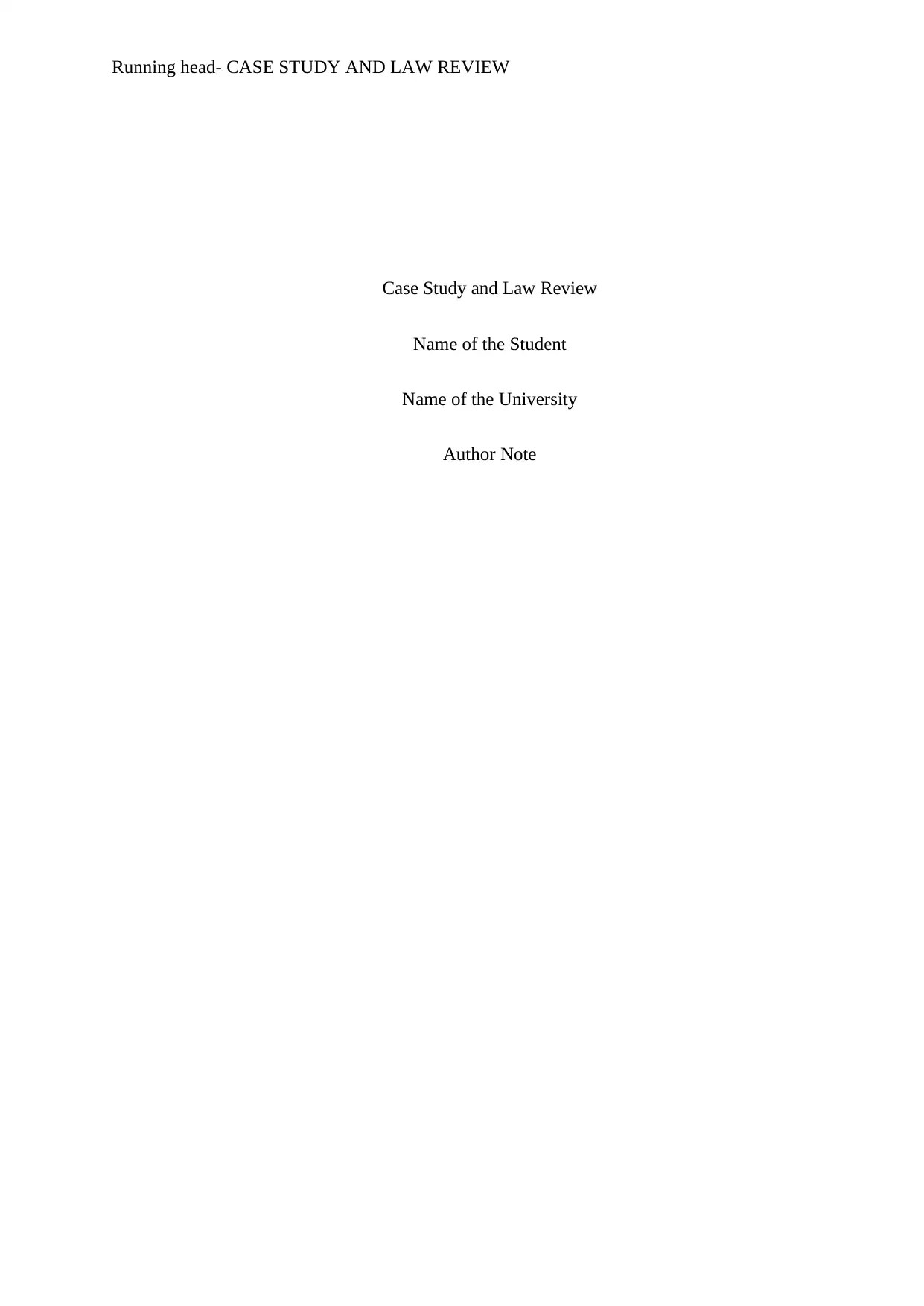
Running head- CASE STUDY AND LAW REVIEW
Case Study and Law Review
Name of the Student
Name of the University
Author Note
Case Study and Law Review
Name of the Student
Name of the University
Author Note
Paraphrase This Document
Need a fresh take? Get an instant paraphrase of this document with our AI Paraphraser
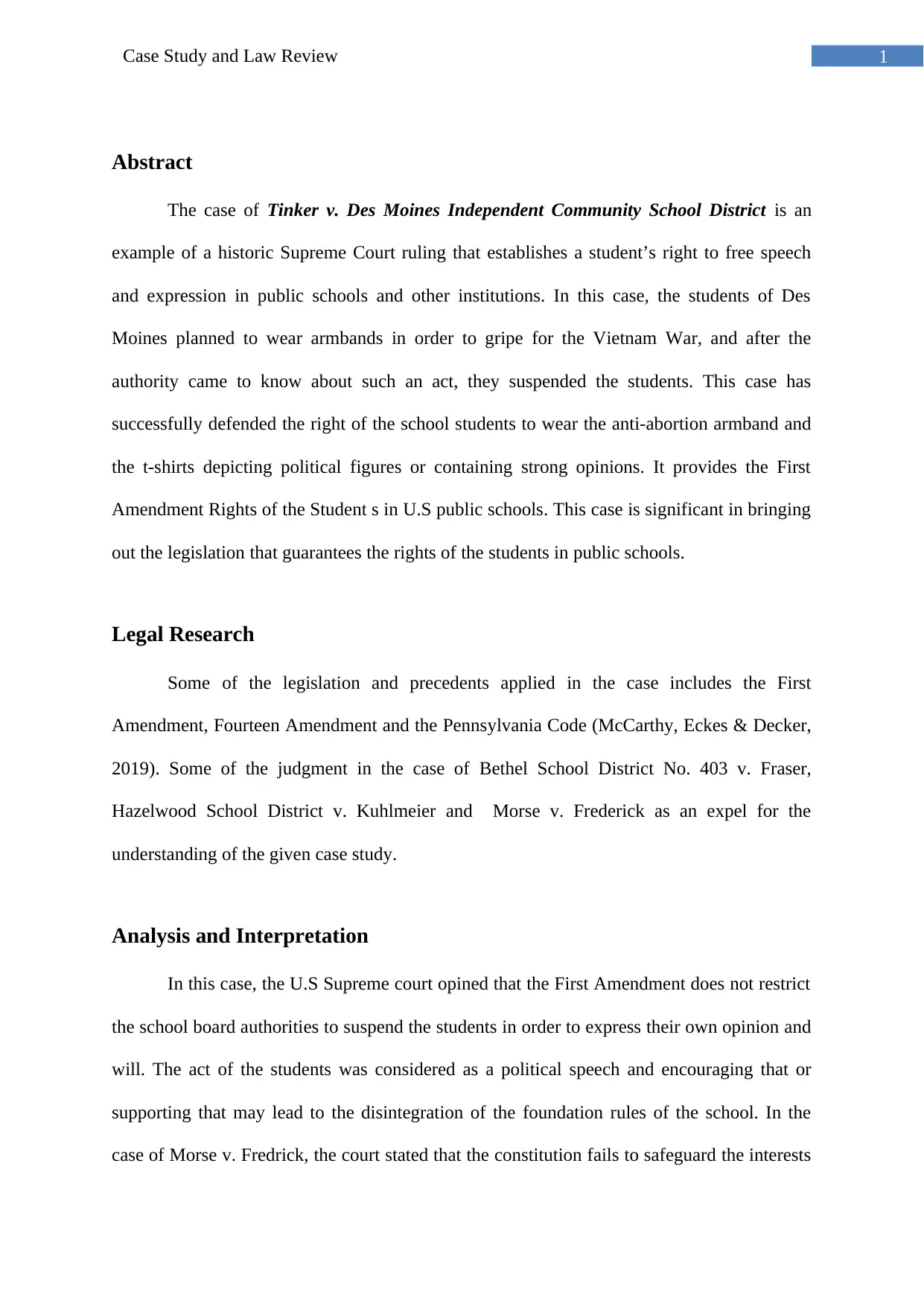
1Case Study and Law Review
Abstract
The case of Tinker v. Des Moines Independent Community School District is an
example of a historic Supreme Court ruling that establishes a student’s right to free speech
and expression in public schools and other institutions. In this case, the students of Des
Moines planned to wear armbands in order to gripe for the Vietnam War, and after the
authority came to know about such an act, they suspended the students. This case has
successfully defended the right of the school students to wear the anti-abortion armband and
the t-shirts depicting political figures or containing strong opinions. It provides the First
Amendment Rights of the Student s in U.S public schools. This case is significant in bringing
out the legislation that guarantees the rights of the students in public schools.
Legal Research
Some “of the legislation and precedents applied in the case includes the First
Amendment, Fourteen Amendment and the Pennsylvania Code (McCarthy, Eckes & Decker,
2019). Some of the judgment in the case of Bethel School District No. 403 v. Fraser,
Hazelwood School District v. Kuhlmeier and Morse v. Frederick as an expel for the
understanding of the given case study.”
Analysis and Interpretation
In this case, the U.S Supreme court opined that the First Amendment does not restrict
the school board authorities to suspend the students in order to express their own opinion and
will. The act of the students was considered as a political speech and encouraging that or
supporting that may lead to the disintegration of the foundation rules of the school. In the
case of Morse v. Fredrick, the court stated that the constitution fails to safeguard the interests
Abstract
The case of Tinker v. Des Moines Independent Community School District is an
example of a historic Supreme Court ruling that establishes a student’s right to free speech
and expression in public schools and other institutions. In this case, the students of Des
Moines planned to wear armbands in order to gripe for the Vietnam War, and after the
authority came to know about such an act, they suspended the students. This case has
successfully defended the right of the school students to wear the anti-abortion armband and
the t-shirts depicting political figures or containing strong opinions. It provides the First
Amendment Rights of the Student s in U.S public schools. This case is significant in bringing
out the legislation that guarantees the rights of the students in public schools.
Legal Research
Some “of the legislation and precedents applied in the case includes the First
Amendment, Fourteen Amendment and the Pennsylvania Code (McCarthy, Eckes & Decker,
2019). Some of the judgment in the case of Bethel School District No. 403 v. Fraser,
Hazelwood School District v. Kuhlmeier and Morse v. Frederick as an expel for the
understanding of the given case study.”
Analysis and Interpretation
In this case, the U.S Supreme court opined that the First Amendment does not restrict
the school board authorities to suspend the students in order to express their own opinion and
will. The act of the students was considered as a political speech and encouraging that or
supporting that may lead to the disintegration of the foundation rules of the school. In the
case of Morse v. Fredrick, the court stated that the constitution fails to safeguard the interests
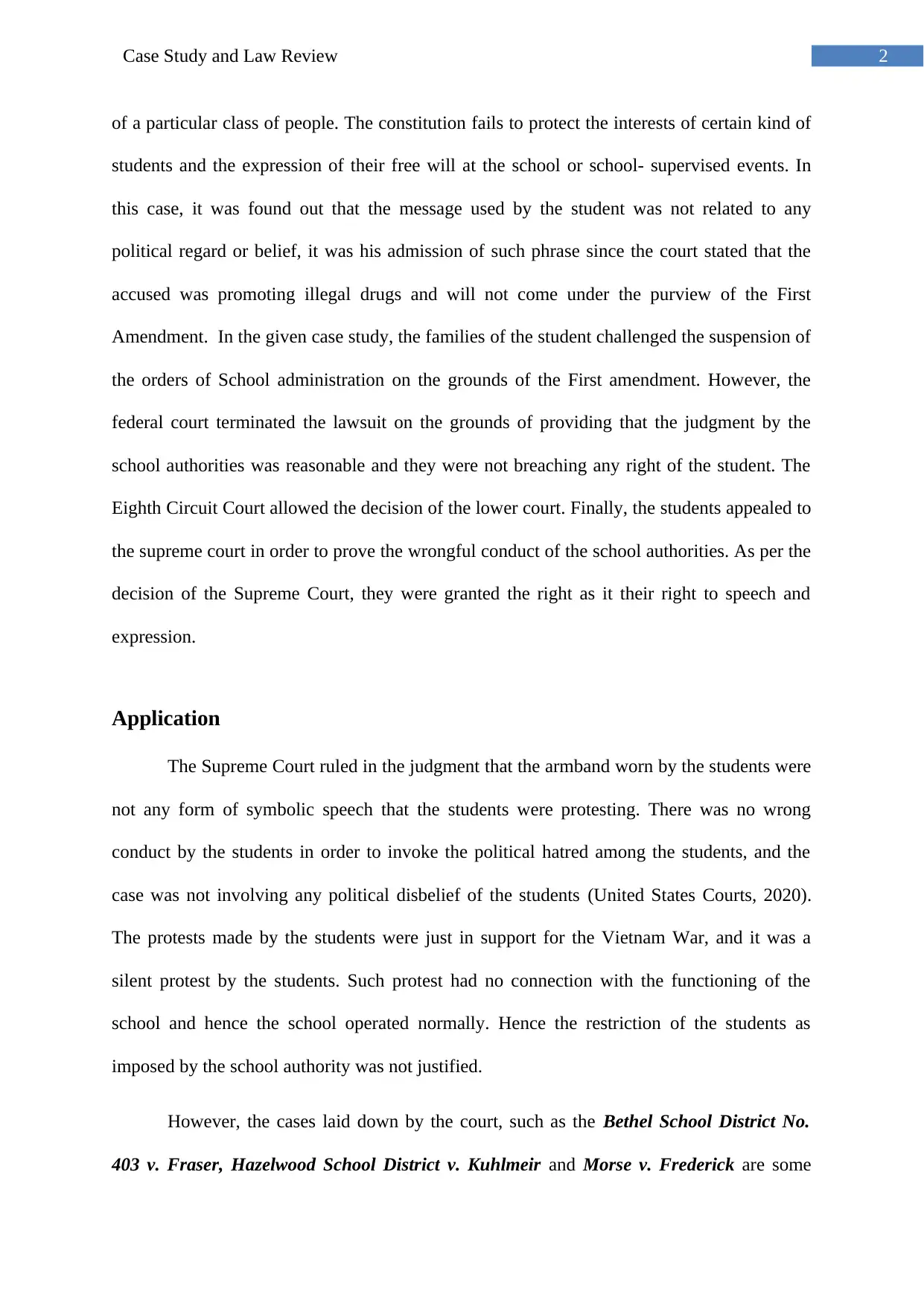
2Case Study and Law Review
of a particular class of people. The constitution fails to protect the interests of certain kind of
students and the expression of their free will at the school or school- supervised events. In
this case, it was found out that the message used by the student was not related to any
political regard or belief, it was his admission of such phrase since the court stated that the
accused was promoting illegal drugs and will not come under the purview of the First
Amendment. In the given case study, the families of the student challenged the suspension of
the orders of School administration on the grounds of the First amendment. However, the
federal court terminated the lawsuit on the grounds of providing that the judgment by the
school authorities was reasonable and they were not breaching any right of the student. The
Eighth Circuit Court allowed the decision of the lower court. Finally, the students appealed to
the supreme court in order to prove the wrongful conduct of the school authorities. As per the
decision of the Supreme Court, they were granted the right as it their right to speech and
expression.
Application
The Supreme Court ruled in the judgment that the armband worn by the students were
not any form of symbolic speech that the students were protesting. There was no wrong
conduct by the students in order to invoke the political hatred among the students, and the
case was not involving any political disbelief of the students (United States Courts, 2020).
The protests made by the students were just in support for the Vietnam War, and it was a
silent protest by the students. Such protest had no connection with the functioning of the
school and hence the school operated normally. Hence the restriction of the students as
imposed by the school authority was not justified.
However, the cases laid down by the court, such as the Bethel School District No.
403 v. Fraser, Hazelwood School District v. Kuhlmeir and Morse v. Frederick are some
of a particular class of people. The constitution fails to protect the interests of certain kind of
students and the expression of their free will at the school or school- supervised events. In
this case, it was found out that the message used by the student was not related to any
political regard or belief, it was his admission of such phrase since the court stated that the
accused was promoting illegal drugs and will not come under the purview of the First
Amendment. In the given case study, the families of the student challenged the suspension of
the orders of School administration on the grounds of the First amendment. However, the
federal court terminated the lawsuit on the grounds of providing that the judgment by the
school authorities was reasonable and they were not breaching any right of the student. The
Eighth Circuit Court allowed the decision of the lower court. Finally, the students appealed to
the supreme court in order to prove the wrongful conduct of the school authorities. As per the
decision of the Supreme Court, they were granted the right as it their right to speech and
expression.
Application
The Supreme Court ruled in the judgment that the armband worn by the students were
not any form of symbolic speech that the students were protesting. There was no wrong
conduct by the students in order to invoke the political hatred among the students, and the
case was not involving any political disbelief of the students (United States Courts, 2020).
The protests made by the students were just in support for the Vietnam War, and it was a
silent protest by the students. Such protest had no connection with the functioning of the
school and hence the school operated normally. Hence the restriction of the students as
imposed by the school authority was not justified.
However, the cases laid down by the court, such as the Bethel School District No.
403 v. Fraser, Hazelwood School District v. Kuhlmeir and Morse v. Frederick are some
⊘ This is a preview!⊘
Do you want full access?
Subscribe today to unlock all pages.

Trusted by 1+ million students worldwide
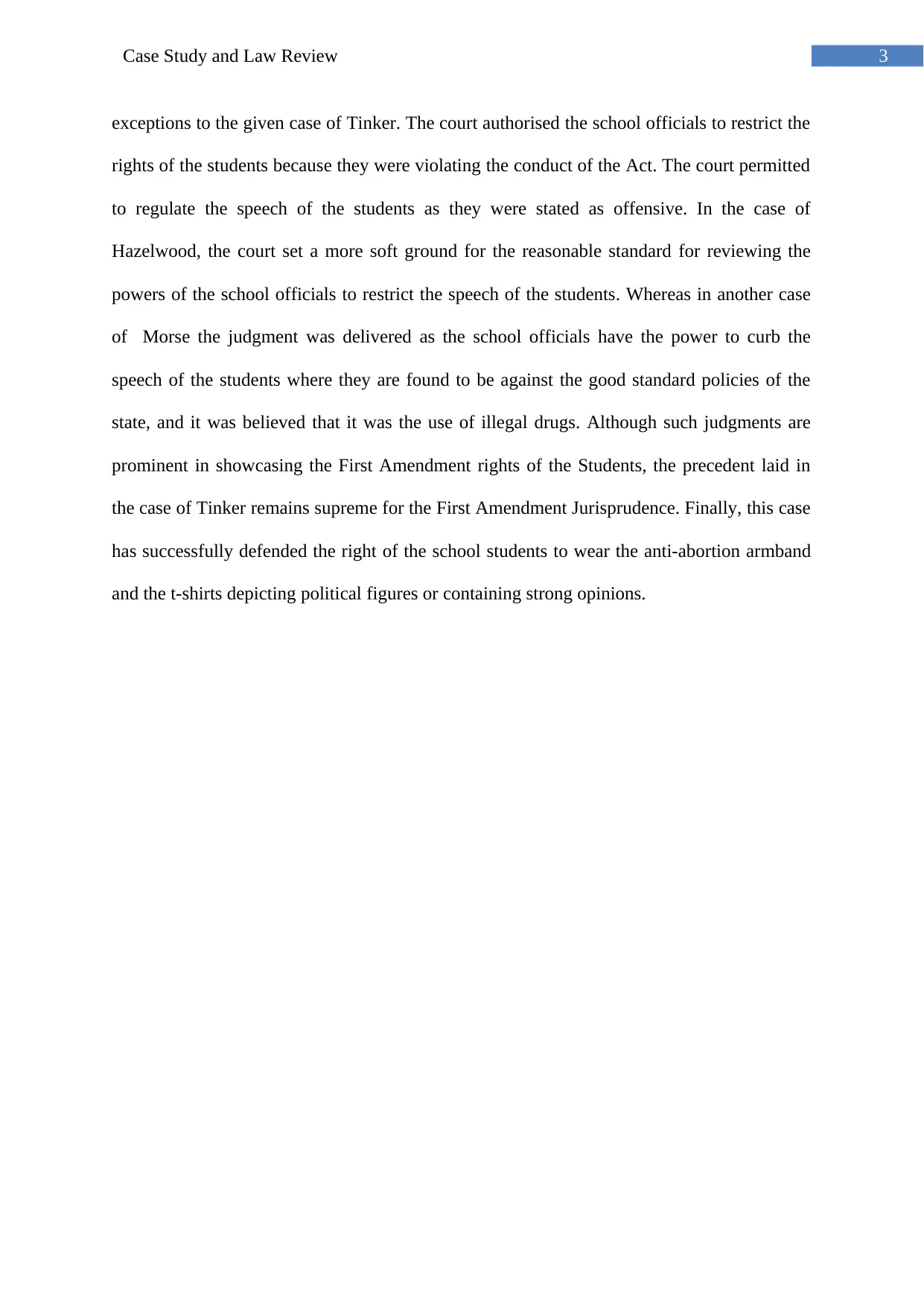
3Case Study and Law Review
exceptions to the given case of Tinker. The court authorised the school officials to restrict the
rights of the students because they were violating the conduct of the Act. The court permitted
to regulate the speech of the students as they were stated as offensive. In the case of
Hazelwood, the court set a more soft ground for the reasonable standard for reviewing the
powers of the school officials to restrict the speech of the students. Whereas in another case
of Morse the judgment was delivered as the school officials have the power to curb the
speech of the students where they are found to be against the good standard policies of the
state, and it was believed that it was the use of illegal drugs. Although such judgments are
prominent in showcasing the First Amendment rights of the Students, the precedent laid in
the case of Tinker remains supreme for the First Amendment Jurisprudence. Finally, this case
has successfully defended the right of the school students to wear the anti-abortion armband
and the t-shirts depicting political figures or containing strong opinions.
exceptions to the given case of Tinker. The court authorised the school officials to restrict the
rights of the students because they were violating the conduct of the Act. The court permitted
to regulate the speech of the students as they were stated as offensive. In the case of
Hazelwood, the court set a more soft ground for the reasonable standard for reviewing the
powers of the school officials to restrict the speech of the students. Whereas in another case
of Morse the judgment was delivered as the school officials have the power to curb the
speech of the students where they are found to be against the good standard policies of the
state, and it was believed that it was the use of illegal drugs. Although such judgments are
prominent in showcasing the First Amendment rights of the Students, the precedent laid in
the case of Tinker remains supreme for the First Amendment Jurisprudence. Finally, this case
has successfully defended the right of the school students to wear the anti-abortion armband
and the t-shirts depicting political figures or containing strong opinions.
Paraphrase This Document
Need a fresh take? Get an instant paraphrase of this document with our AI Paraphraser
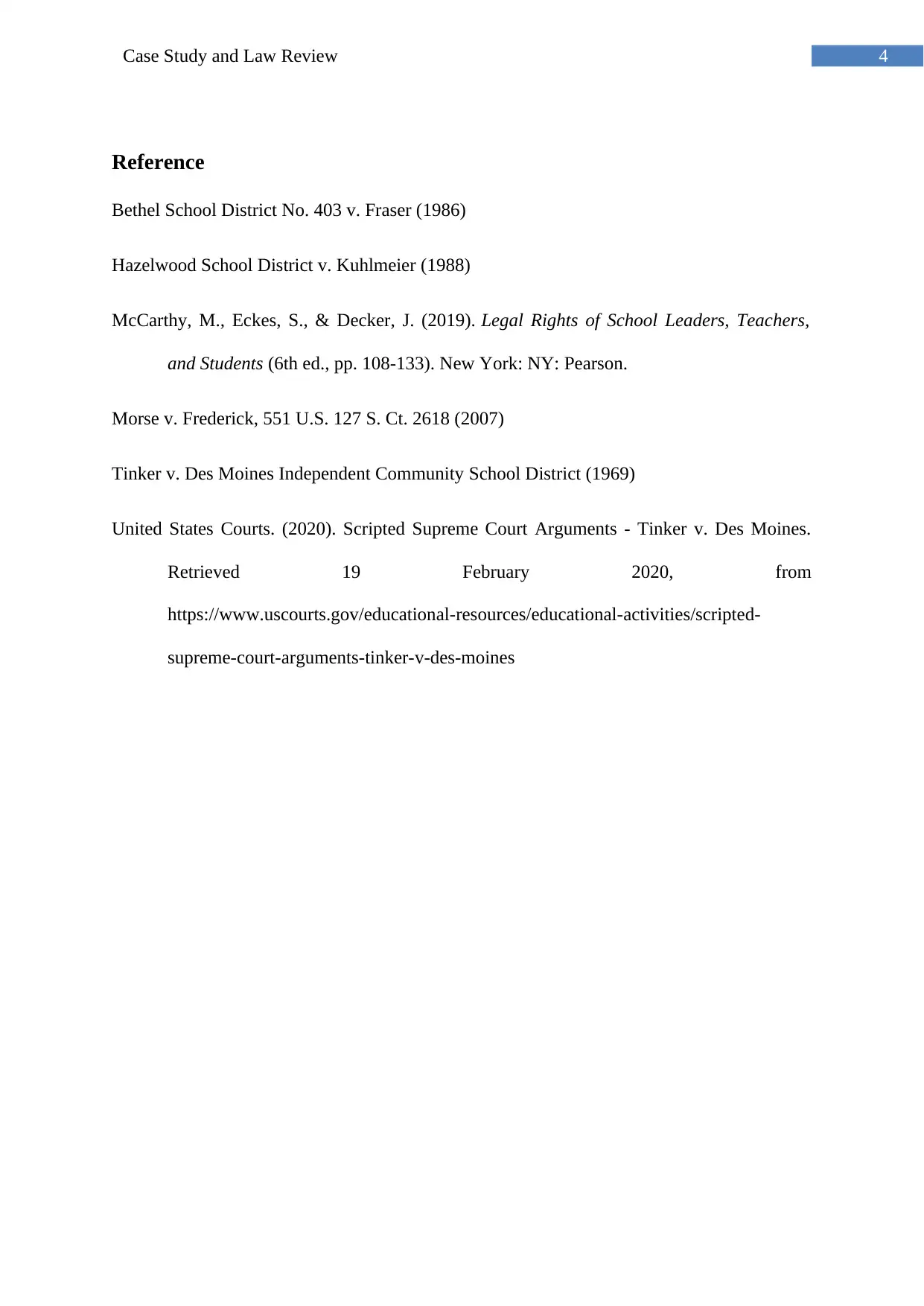
4Case Study and Law Review
Reference
Bethel School District No. 403 v. Fraser (1986)
Hazelwood School District v. Kuhlmeier (1988)
McCarthy, M., Eckes, S., & Decker, J. (2019). Legal Rights of School Leaders, Teachers,
and Students (6th ed., pp. 108-133). New York: NY: Pearson.
Morse v. Frederick, 551 U.S. 127 S. Ct. 2618 (2007)
Tinker v. Des Moines Independent Community School District (1969)
United States Courts. (2020). Scripted Supreme Court Arguments - Tinker v. Des Moines.
Retrieved 19 February 2020, from
https://www.uscourts.gov/educational-resources/educational-activities/scripted-
supreme-court-arguments-tinker-v-des-moines
Reference
Bethel School District No. 403 v. Fraser (1986)
Hazelwood School District v. Kuhlmeier (1988)
McCarthy, M., Eckes, S., & Decker, J. (2019). Legal Rights of School Leaders, Teachers,
and Students (6th ed., pp. 108-133). New York: NY: Pearson.
Morse v. Frederick, 551 U.S. 127 S. Ct. 2618 (2007)
Tinker v. Des Moines Independent Community School District (1969)
United States Courts. (2020). Scripted Supreme Court Arguments - Tinker v. Des Moines.
Retrieved 19 February 2020, from
https://www.uscourts.gov/educational-resources/educational-activities/scripted-
supreme-court-arguments-tinker-v-des-moines

5Case Study and Law Review
⊘ This is a preview!⊘
Do you want full access?
Subscribe today to unlock all pages.

Trusted by 1+ million students worldwide
1 out of 6
Related Documents
Your All-in-One AI-Powered Toolkit for Academic Success.
+13062052269
info@desklib.com
Available 24*7 on WhatsApp / Email
![[object Object]](/_next/static/media/star-bottom.7253800d.svg)
Unlock your academic potential
Copyright © 2020–2026 A2Z Services. All Rights Reserved. Developed and managed by ZUCOL.




